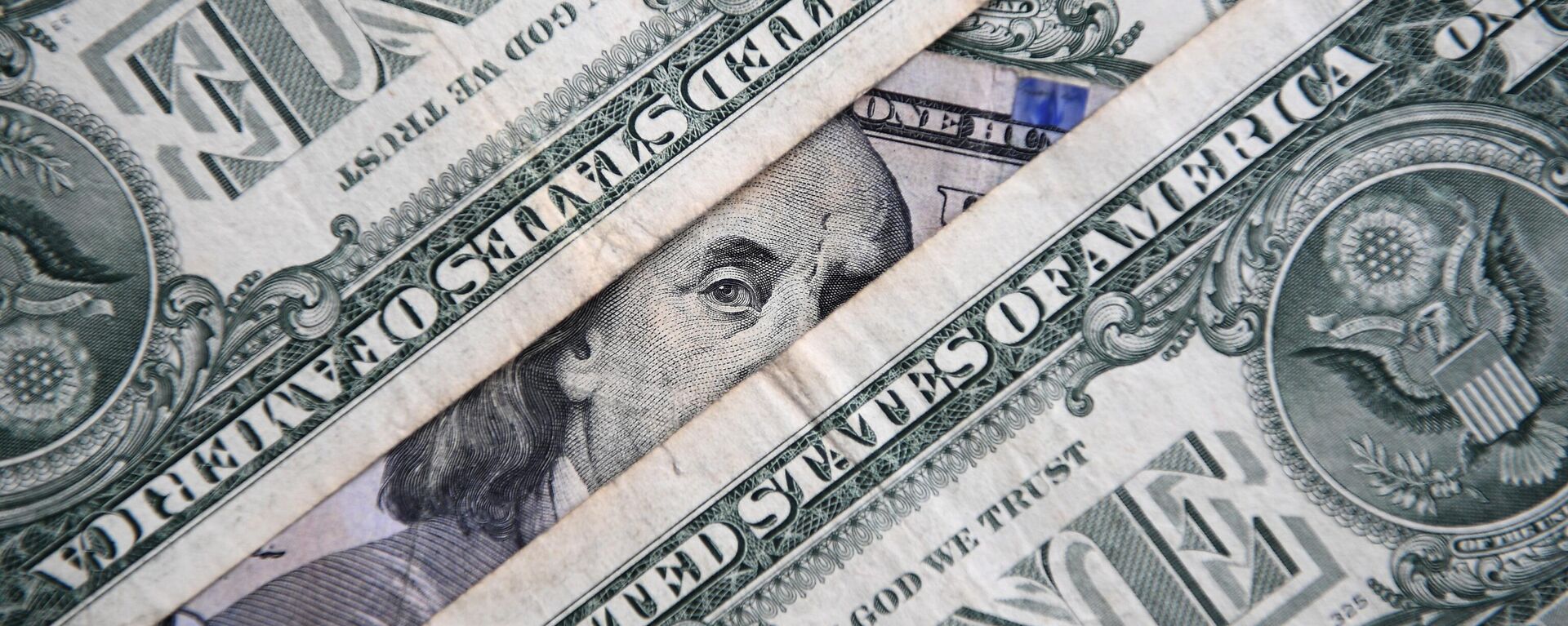https://sputnikglobe.com/20230422/why-is-china-boosting-its-gold-reserves-1109758961.html
Why is China Boosting Its Gold Reserves?
Why is China Boosting Its Gold Reserves?
Sputnik International
While between September 2019 and October 2022, China’s gold reserves remained unchanged, November of last year saw Beijing’s push for bulking up bullions.
2023-04-22T10:29+0000
2023-04-22T10:29+0000
2023-04-22T18:56+0000
asia
china
us
economy
gold reserves
sanctions
dedollarisation
https://cdn1.img.sputnikglobe.com/img/107564/03/1075640356_0:0:1920:1080_1920x0_80_0_0_9ae959e10bfd753f3fa53362fdc9feb7.jpg
China is boosting its gold reserves for a fifth straight month because Beijing is preparing for possible future sanctions against the PRC, a New York based newspaper reported citing industry experts.Chinese scholar and finance author Sun Xiaoji said that China’s Central Bank is actively increasing its gold holdings as it hasn't excluded a scenario where it is expelled from the global US dollar payment system.The expert also commented on the current push for dedollarization by the BRICS group, of which China is a member. The group also includes Brazil, Russia, India, and South Africa.UK-based financial consultant Fang Qi, in turn, told the outlet that he believes China’s Central Bank has reduced its holdings of US bonds and increased Chinese gold reserves mainly out of concern for rates of return and reducing volatility.However, Ekaterina Zaklyazminskaya, Ph.D. in Economics, senior research fellow at the Center for World Politics and Strategic Analysis at the Institute of China and Modern Asia of the Russian Academy of Sciences, argued that American sanctions are not the root cause of such a move from Beijing, since China has been under them for more than a year.“China is already under US sanctions. You have to take the economic factor into account, that is, why China makes such investments in gold and refuses US Treasury bonds," she told Sputnik. “We are witnessing a reshaping of the world economy, the formatting of a new world economic order is now very active. China started this process literally not yesterday. The desire for de-dollarization has been observed in China since 2009, after just a major financial and economic crisis, which was unleashed by the United States. China seeks to increase the number of mutual settlements in national currencies. In particular, at the moment, China uses mutual settlements in national currencies with more than 30 countries of the world, that is, with countries such as Russia, Iran, India, Singapore, Venezuela, Turkiye, Indonesia,” Zaklyazminskaya added.The developments followed China clinching a deal with Brazil late last month to trade in their own currencies, in a bid to abandon the US dollar as an intermediary.Western media, in turn, reported at the time that the deal is expected “to enable China, the top rival to US economic hegemony, and Brazil, the biggest economy in Latin America, to conduct their massive trade and financial transactions directly, exchanging yuan for reals and vice versa instead of going through the dollar.”A recent survey report by the Central Bank of Brazil showed that as of the end of 2022, the proportion of the yuan in Brazil's international exchange reserves had reached 5.37%, exceeding the proportion of the euro at 4.74%, which means that the yuan becomes the South American country's second-largest reserve currency.
https://sputnikglobe.com/20230209/white-house-considers-restricting-chinas-access-to-dollars-media-reports-1107270461.html
china
Sputnik International
feedback@sputniknews.com
+74956456601
MIA „Rossiya Segodnya“
2023
Oleg Burunov
https://cdn1.img.sputnikglobe.com/img/07e4/09/0b/1080424846_0:0:2048:2048_100x100_80_0_0_3d7b461f8a98586fa3fe739930816aea.jpg
Oleg Burunov
https://cdn1.img.sputnikglobe.com/img/07e4/09/0b/1080424846_0:0:2048:2048_100x100_80_0_0_3d7b461f8a98586fa3fe739930816aea.jpg
News
en_EN
Sputnik International
feedback@sputniknews.com
+74956456601
MIA „Rossiya Segodnya“
Sputnik International
feedback@sputniknews.com
+74956456601
MIA „Rossiya Segodnya“
Oleg Burunov
https://cdn1.img.sputnikglobe.com/img/07e4/09/0b/1080424846_0:0:2048:2048_100x100_80_0_0_3d7b461f8a98586fa3fe739930816aea.jpg
china's push for dedollarization, a significant rise in china's gold reserves, process of dedollarization
china's push for dedollarization, a significant rise in china's gold reserves, process of dedollarization
Why is China Boosting Its Gold Reserves?
10:29 GMT 22.04.2023 (Updated: 18:56 GMT 22.04.2023) While between September 2019 and October 2022, China’s gold reserves remained unchanged, November of last year saw Beijing push to bulk up on bullion.
China is boosting its gold reserves for a fifth straight month because Beijing is preparing for possible future sanctions against the PRC, a New York based newspaper reported citing industry experts.
Chinese scholar and finance author Sun Xiaoji said that China’s Central Bank is actively increasing its gold holdings as it hasn't excluded a scenario where it is expelled from the global US dollar payment system.
“Domestically, the Chinese Communist Party (CCP) advertises that it is ‘proactively challenging the United States and de-dollarizing,’ but the real reason is that it knows it will be sanctioned by the United States sooner or later. Therefore it is looking for an alternative to the US dollar, and the only alternative is gold,” Sun argued.
The expert also commented on the current push for dedollarization by
the BRICS group, of which China is a member. The group also includes Brazil, Russia, India, and South Africa.
Sun said the reason for dedollarization among the BRICS countries is not that China and Russia have decided to proactively scrap their use of the US dollar. He claimed the matter is that the recent wave of globalization has come to an end, and that the world is about to enter a stage of regional development or even inter-regional confrontation.
UK-based financial consultant Fang Qi, in turn, told the outlet that he believes China’s Central Bank has reduced its holdings of US bonds and increased
Chinese gold reserves mainly out of concern for rates of return and reducing volatility.
The remarks come a few weeks after People’s Bank of China raised its golden reserves by about 18 tons, following the hiatus that was in place between September 2019 and October 2022. The country’s total stockpiles of bullions currently sit at about 2,068 tons, after growing by about 102 tons in the four months before March.
However, Ekaterina Zaklyazminskaya, Ph.D. in Economics, senior research fellow at the Center for World Politics and Strategic Analysis at the Institute of China and Modern Asia of the Russian Academy of Sciences, argued that American sanctions are not the root cause of such a move from Beijing, since China has been under them for more than a year.
“China is already under US sanctions. You have to take the economic factor into account, that is, why China makes such investments in gold and refuses US Treasury bonds," she told Sputnik.
"China wants to hedge risks. The instability of the American economy leads to such decisions. Of course, the political factor should not be discounted.”
“We are witnessing a reshaping of the world economy, the formatting of a new world economic order is now very active. China started this process literally not yesterday. The desire for de-dollarization has been observed in China since 2009, after just a major financial and economic crisis, which was unleashed by the United States. China seeks to increase the number of mutual settlements in national currencies. In particular, at the moment, China uses mutual settlements in national currencies with more than 30 countries of the world, that is, with countries such as Russia, Iran, India, Singapore, Venezuela, Turkiye, Indonesia,” Zaklyazminskaya added.

9 February 2023, 15:18 GMT
The developments followed China clinching a deal with Brazil late last month to trade in their own currencies, in a bid to abandon the US dollar as an intermediary.
Western media, in turn, reported at the time that the deal is expected “to enable China, the top rival to US economic hegemony, and Brazil, the biggest economy in Latin America, to conduct their massive trade and financial transactions directly, exchanging yuan for reals and vice versa instead of going through the dollar.”
A recent survey report by the Central Bank of Brazil showed that as of the end of 2022, the proportion of the yuan in Brazil's international exchange reserves had reached 5.37%, exceeding the proportion of the euro at 4.74%, which means that the yuan becomes the South American country's second-largest reserve currency.




